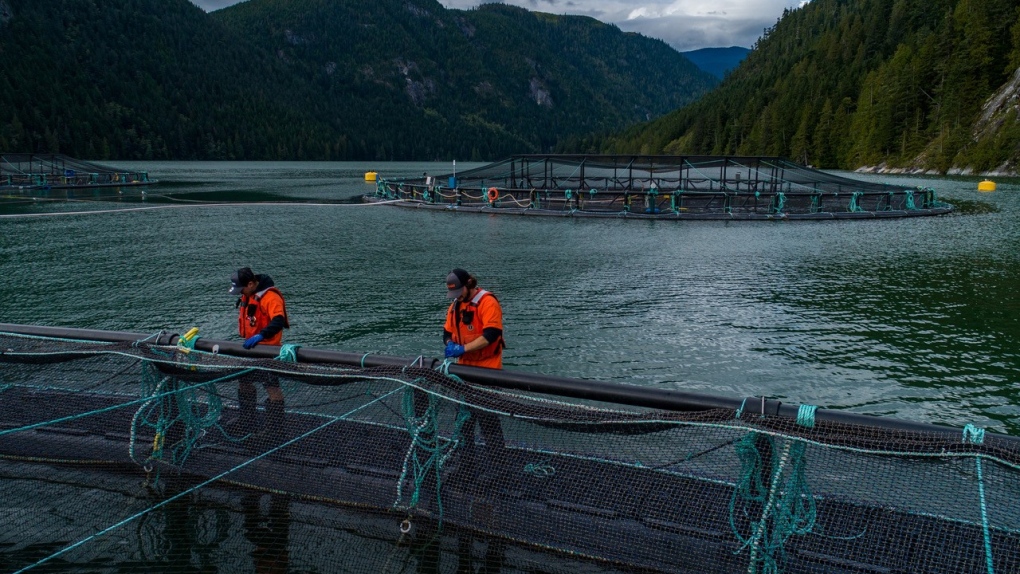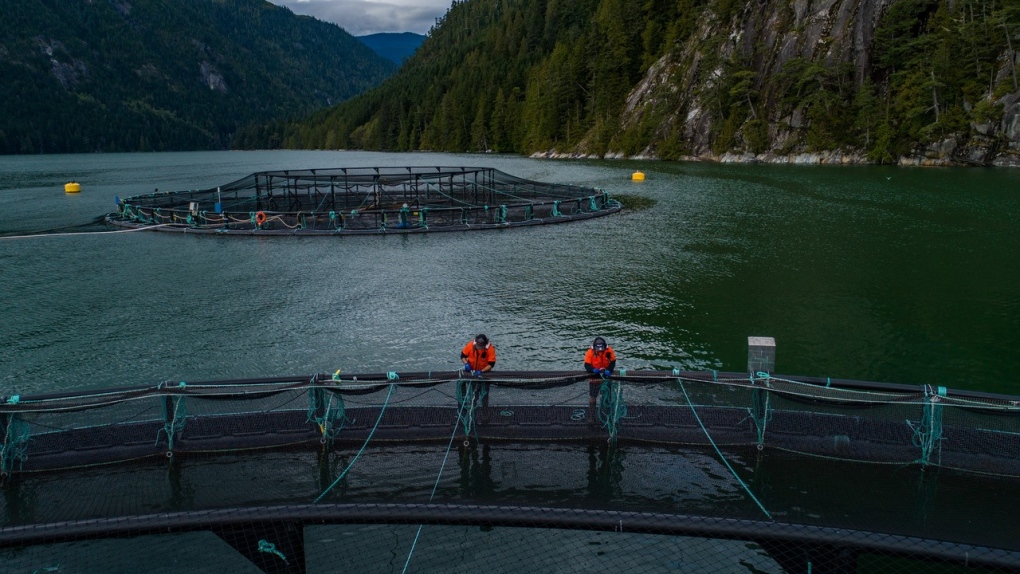Court ruling doesn't sink Ottawa's plans to close B.C. salmon farms, critics say
 (BC Salmon Farmers Association)
(BC Salmon Farmers Association)
West Coast environmental groups and First Nations opposed to salmon farming are urging the federal Fisheries Minister Joyce Murray to hold the line after a recent court ruling set aside a decision by her predecessor to phase out salmon farming in the Discovery Islands.
The Federal Court ruling found then-fisheries minister Bernadette Jordan contravened the right of procedural fairness owed to fish farm companies when deciding to shut down 19 operations in the waters near Campbell River on eastern Vancouver Island by the end of June.
The decision means Murray will have to revisit Jordan's 2020 promise to not renew aquaculture licences in the region that are set to expire in two months, said Bob Chamberlin, chair of the First Nations Wild Salmon Alliance.
“I don't see it as a slam dunk that we're going to have fish farms there,” Chamberlin said.
“But now the current minister is going to be faced with having to make the same uncomfortable decision that a previous minister made.”
Murray will also have to reaffirm Ottawa's commitment to reconciliation, given that more than 100 First Nations reliant on wild salmon are opposed to open net-pen salmon farms in B.C. waters, he said.
The minister's mandate letter commits to transitioning away from open net-pen salmon farms by 2025, and the NDP is backing the minority Liberal government on the issue, so Chamberlin believes there's enough political will to stay on track with the removal of Discovery Islands fish farms.
Stan Proboszcz, science adviser at Watershed Watch Salmon Society, agreed saying the companies can't just go in and restock farm sites now because a federal transfer licence is still required from the ministry.
The court ruling was largely procedural in nature, and doesn't impact Murray's right as minister to refuse licence renewals, said Proboszcz.
“We see it as a minor setback,” he said, adding it just suggests the ministry needs to be more engaged with industry during the decision-making process.
“Everything we've heard from this government is about removing salmon farms, so I don't see this government doing an about-face on this decision.
“I think they're just going to follow suit with their previous endeavours, and hopefully, they will just do it a little bit more appropriately, as the judge has outlined.”
 (BC Salmon Farmers Association)
(BC Salmon Farmers Association)
The BC Salmon Farmers Association said in a statement it was encouraged by the court ruling and saw it as a positive development for coastal communities and the thousands of jobs the sector sustains.
Aquaculture companies Mowi Canada West, Cermaq Canada and Grieg Seafood had sought a judicial review of the decision that prevented them from restocking their operations, arguing it lacked reasons and didn't reflect “an appreciation of the facts.”
The association declined to say if the companies plan on resuming operations in the Discovery Islands following the decision.
“We will be reaching out to First Nations in whose territories we operate to review this decision and will have more to say in the following days and weeks ahead,” the association said.
Murray's office did not clarify if the ruling would hinder her ability to deny new salmon farm licences in the Discovery Islands when the existing ones expire, or if a court appeal was being considered.
The decision to phase out fish farms in the Discovery Islands was based on consultation with First Nations, said ministry spokesperson Kevin Lemkay in an email.
Murray will make decisions on next steps in due course, and remains committed to transitioning away from open net-pen salmon farming in coastal B.C. waters, Lemkay said.
Homalco First Nation Chief Darren Blaney - who represents one of the seven nations in the Discovery Islands consulted by Jordan before her decision to phase out salmon farms - is cautiously optimistic the new minister will honour the commitment.
“We'll raise the issue, but I think she'll hold the line on that,” said Blaney, who has been fighting for decades to have fish farms removed from his nation's territorial waters.
“But we're going to push to make sure she doesn't change her mind.”
The salmon farms harbour disease and sea lice, which pose risks to migrating juvenile salmon that pass through the region, he said.
The aquaculture companies suggest they'll act in accordance with First Nations' wishes around whether they want fish farms in their traditional territories, but continue to challenge decisions based on First Nations' input in court, Blaney said.
“Our message has been pretty clear, yet they're fighting to stay and kill off our salmon.
“And what's most frustrating about it is they have so little regard for our culture and our salmon.”
With files from Amy Smart, The Canadian Press
CTVNews.ca Top Stories

Can the Governor General do what Pierre Poilievre is asking? This expert says no
A historically difficult week for Prime Minister Justin Trudeau and his Liberal government ended with a renewed push from Conservative Leader Pierre Poilievre to topple this government – this time in the form a letter to the Governor General.
'I'm still thinking pinch me': lost puppy reunited with family after five years
After almost five years of searching and never giving up hope, the Tuffin family received the best Christmas gift they could have hoped for: being reunited with their long-lost puppy.
Wrongfully convicted N.B. man has mixed feelings since exoneration
Robert Mailman, 76, was exonerated on Jan. 4 of a 1983 murder for which he and his friend Walter Gillespie served lengthy prison terms.
Pickup truck driver killed by police after driving through Texas mall and injuring 5
A pickup truck driver fleeing police careened through the doors of a JCPenney store in Texas and continued through a busy mall, injuring five people before he was fatally shot by officers, authorities said.
Two U.S. Navy pilots shot down over Red Sea in apparent 'friendly fire' incident, U.S. military says
Two U.S. Navy pilots were shot down Sunday over the Red Sea in an apparent 'friendly fire' incident, the U.S military said, marking the most serious incident to threaten troops in over a year of America targeting Yemen's Houthi rebels.
BREAKING NEWS 6 adults, 4 children taken to hospital following suspected carbon monoxide exposure in Vanier
The Ottawa Paramedic Service says ten people were taken to hospital, one of them in life-threatening condition, following an incident of suspected carbon monoxide exposure Sunday morning in the neighbourhood of Vanier.
Big splash: Halifax mermaid waves goodbye after 16 years
Halifax's Raina the Mermaid is closing her business after 16 years in the Maritimes.
Second body recovered from site of B.C. landslide
The second resident of a home that was destroyed by a landslide in Lions Bay, B.C., last weekend was found dead Saturday, officials confirmed.
A small plane crashes into a Brazilian town popular with tourists and the number of dead is unclear
A small plane crashed into a Brazilian town that is popular with tourists on Sunday, killing several people, local officials said.































